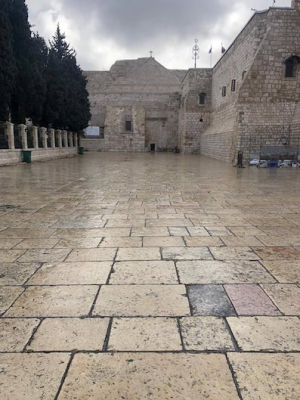The isolation imposed by Covid-19 has led to the rediscovery of the family. For Fr Rami Asakrieh, parish priest in Bethlehem, this Christmas will be a special celebration because it is an “opportunity to focus on the essential.” It will bring joy “that is not worldly” but “stems from faith.”
Despite the pandemic and problems associated with economic hardships, people in the Holy Land still “want to be together, know each other, and find new and different ways of support,” said Fr Rami.
Following the outbreak of the pandemic, he noted that “the faithful have come to realise that they have been immersed for far too long in a reality connected to the materialism of the world, on the need for superficial things, which end up taking away time and energy.”
As Christmas approaches, “the importance of rest, of time spent together, of sharing despite suffering is being rediscovered” and is becoming evident. Parents perhaps offer one less gift, but “end up rediscovering a more family-oriented and intimate experience.”
Although the pandemic did not stop religious activities, it has reduced the presence of pilgrims to zero. In the Holy Land, almost one Christian in three depends on religious tourism.
The crisis has also come to Bethlehem, Jesus’ birthplace. Usually, Midnight Mass at the Church of Saint Catherine, next to the Basilica of the Nativity, is crowded with hundreds of local and foreign worshippers.
In a meeting with Church leaders, Palestinian President Mahmoud Abbas said that “due to the pandemic and for the safety of all, the Midnight Mass will be reserved for the clergy and will be broadcast on Palestinian TV.”
Health restrictions are in place across the region to contain the spread of the virus. In the West Bank, the authorities have reported so far 78,000 cases with 740 deaths.
Bethlehem has always “suffered from the political and economic situation,” Fr Rami explained. Religious tourism and pilgrimages “represented salvation” for related activities, “like restaurants, bars, transport, even activities like printing.”
Since no one is coming because of the novel coronavirus pandemic, “everything seems to have stopped. More than 40 per cent of the city is not well. Before the pandemic we could count on help from outside, but now even those who supported us are ill or cannot send aid.”
Back in the spring, “Even the Good Friday collection dropped considerably . . . We are economically and politically at the mercy of powers that be, whilst concerns and fear for the future are undeniable.”
Scheduled events will go on as planned though, including the entry on 24 December of the new Patriarch of Jerusalem of the Latins, Mgr Pierbattista Pizzaballa, but without worshippers in compliance with health regulations.
But Fr Rami says: “This Christmas feels special, because it provides an opportunity to focus on the essential, leaving aside the superfluous. Christ was born among us, he came for everyone, no one is excluded from his message of salvation and we must focus on this.”
Of course, seeing the square and a basilica without pilgrims “is certainly a source of sadness, but for us being able to enter and pray remains a sign of great hope. We see God is still with us, filling us with joy as we visit the holy place.” The church remains a privileged place, a sort of “refuge where we can pray.”
In recent weeks, the faithful “have never stopped going to church” whilst respecting social distancing, wearing masks, and getting their temperature taken.
“We have continued to celebrate Masses, weddings, and baptisms, and even if the Nativity was closed, we gather in the church of Saint Francis below.”
“We are one body of Christ, and if one member is ill the other also suffers and takes care of him. That is why we will continue to pray from this holy place and fill hearts with joy and hope.
“This joy is not worldly but stems from faith, and the certainty of being welcomed by the Lord, of entrusting ourselves to his mercy and to his help to help us experience Christmas.”
Source: indcatholicnews.com






